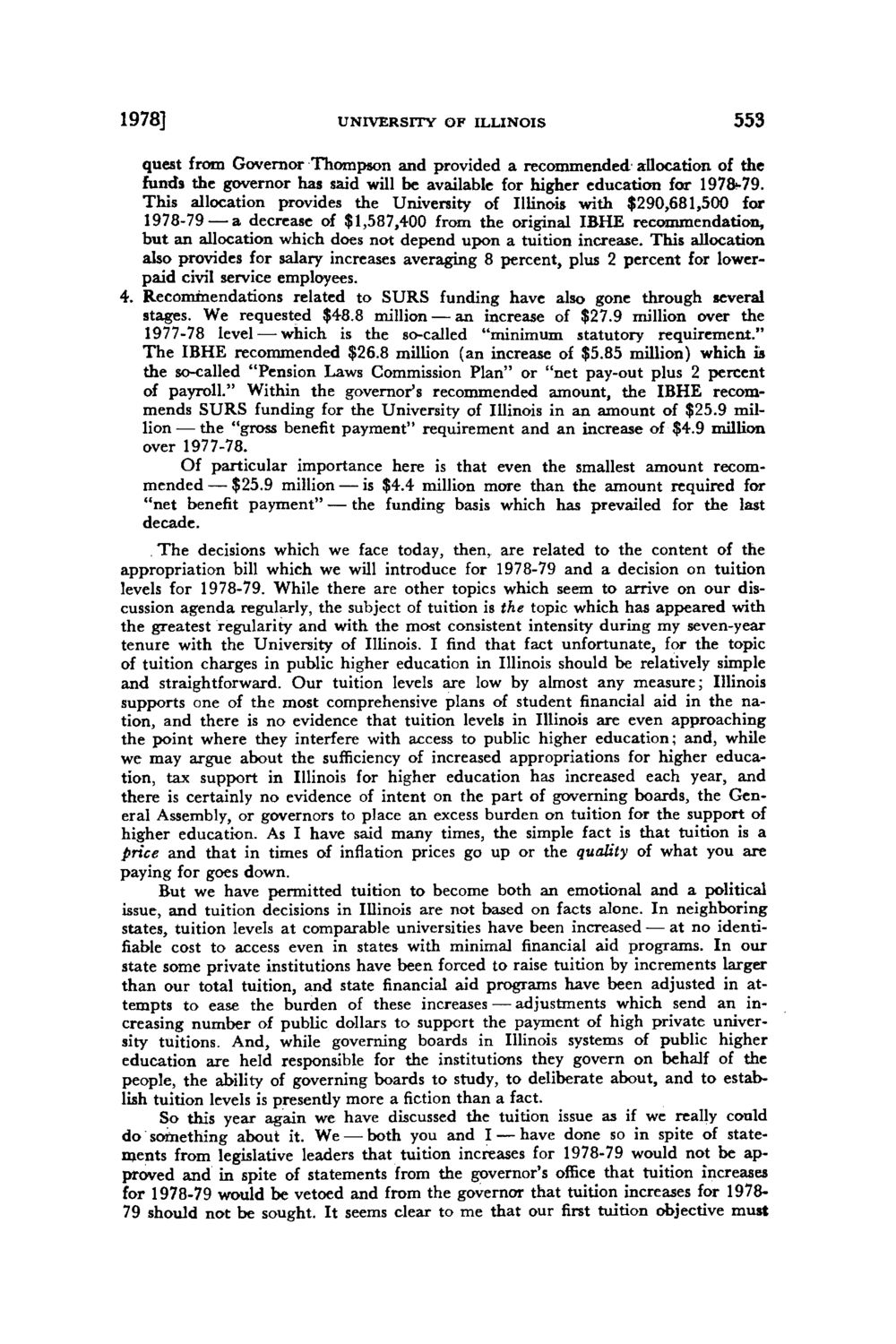| |
| |
Caption: Board of Trustees Minutes - 1978
This is a reduced-resolution page image for fast online browsing.

EXTRACTED TEXT FROM PAGE:
1978] UNIVERSITY OF ILLINOIS 553 quest from Governor Thompson and provided a recommended allocation of the funds the governor has said will be available for higher education for 197&-79. This allocation provides the University of Illinois with $290,681,500 for 1978-79 — a decrease of $1,587,400 from the original IBHE recommendation, b u t an allocation which does not depend upon a tuition increase. This allocation also provides for salary increases averaging 8 percent, plus 2 percent for lowerpaid civil service employees. 4. Recommendations related to SURS funding have also gone through several stages. We requested $48.8 million — an increase of $27.9 million over the 1977-78 level — which is the so-called "minimum statutory requirement." T h e IBHE recommended $26.8 million (an increase of $5.85 million) which is the so-called "Pension Laws Commission Plan" or "net pay-out plus 2 percent of payroll." Within the governor's recommended amount, the IBHE recommends SURS funding for the University of Illinois in an amount of $25.9 million — the "gross benefit payment" requirement and an increase of $4.9 million over 1977-78. Of particular importance here is that even the smallest amount recomm e n d e d — $25.9 million — is $4.4 million more than the amount required for "net benefit payment" — the funding basis which has prevailed for the last decade. T h e decisions which we face today, then, are related to the content of the appropriation bill which we will introduce for 1978-79 and a decision on tuition levels for 1978-79. While there are other topics which seem to arrive on our discussion agenda regularly, the subject of tuition is the topic which has appeared with the greatest regularity and with the most consistent intensity during my seven-year tenure with the University of Illinois. I find that fact unfortunate, for the topic of tuition charges in public higher education in Illinois should be relatively simple and straightforward. Our tuition levels are low by almost any measure; Illinois supports one of the most comprehensive plans of student financial aid in the nation, and there is no evidence that tuition levels in Illinois are even approaching the point where they interfere with access to public higher education; and, while we may argue about the sufficiency of increased appropriations for higher education, tax support in Illinois for higher education has increased each year, and there is certainly no evidence of intent on the part of governing boards, the General Assembly, or governors to place an excess burden on tuition for the support of higher education. As I have said many times, the simple fact is that tuition is a price and that in times of inflation prices go up or the quality of what you are paying for goes down. But we have permitted tuition to become both an emotional and a political issue, and tuition decisions in Illinois are not based on facts alone. In neighboring states, tuition levels at comparable universities have been increased — at no identifiable cost to access even in states with minimal financial aid programs. In our state some private institutions have been forced to raise tuition by increments larger than our total tuition, and state financial aid programs have been adjusted in attempts to ease the burden of these increases — adjustments which send an increasing number of public dollars to support the payment of high private university tuitions. And, while governing boards in Illinois systems of public higher education are held responsible for the institutions they govern on behalf of the people, the ability of governing boards to study, to deliberate about, and to establish tuition levels is presently more a fiction than a fact. So this year again we have discussed the tuition issue as if we really could d o something about it. We — both you and I — have done so in spite of statements from legislative leaders that tuition increases for 1978-79 would not be approved and in spite of statements from the governor's office that tuition increases for 1978-79 would be vetoed and from the governor that tuition increases for 197879 should not be sought. It seems clear to me that our first tuition objective must
| |